Report on Post-Traumatic Stress Disorder in Children and Young People
VerifiedAdded on 2022/12/14
|9
|2925
|425
Report
AI Summary
This report examines post-traumatic stress disorder (PTSD) in children and young people under 18, focusing on the impact of mental health illness on their lives. It explores the prevalence of PTSD, its causes, and symptoms, emphasizing the need for increased awareness and support for affected individuals and their families. The report analyzes the role of parents and the effectiveness of mental health services, particularly CAMHS (Child and Adolescent Mental Health Services), in providing care and guidance. It includes a critical analysis of service user reviews and parental perspectives on support mechanisms, highlighting the challenges parents face in supporting their children's mental health. The report also discusses interventions, treatments, and the strategies parents employ to help children cope with trauma, emphasizing the need for improved guidelines and family engagement in the care process. The findings underscore the importance of comprehensive mental healthcare services and the critical role of parental support in the effective management of PTSD in children and young people. This report is contributed by a student and available on Desklib, a platform offering AI-based study tools for students.
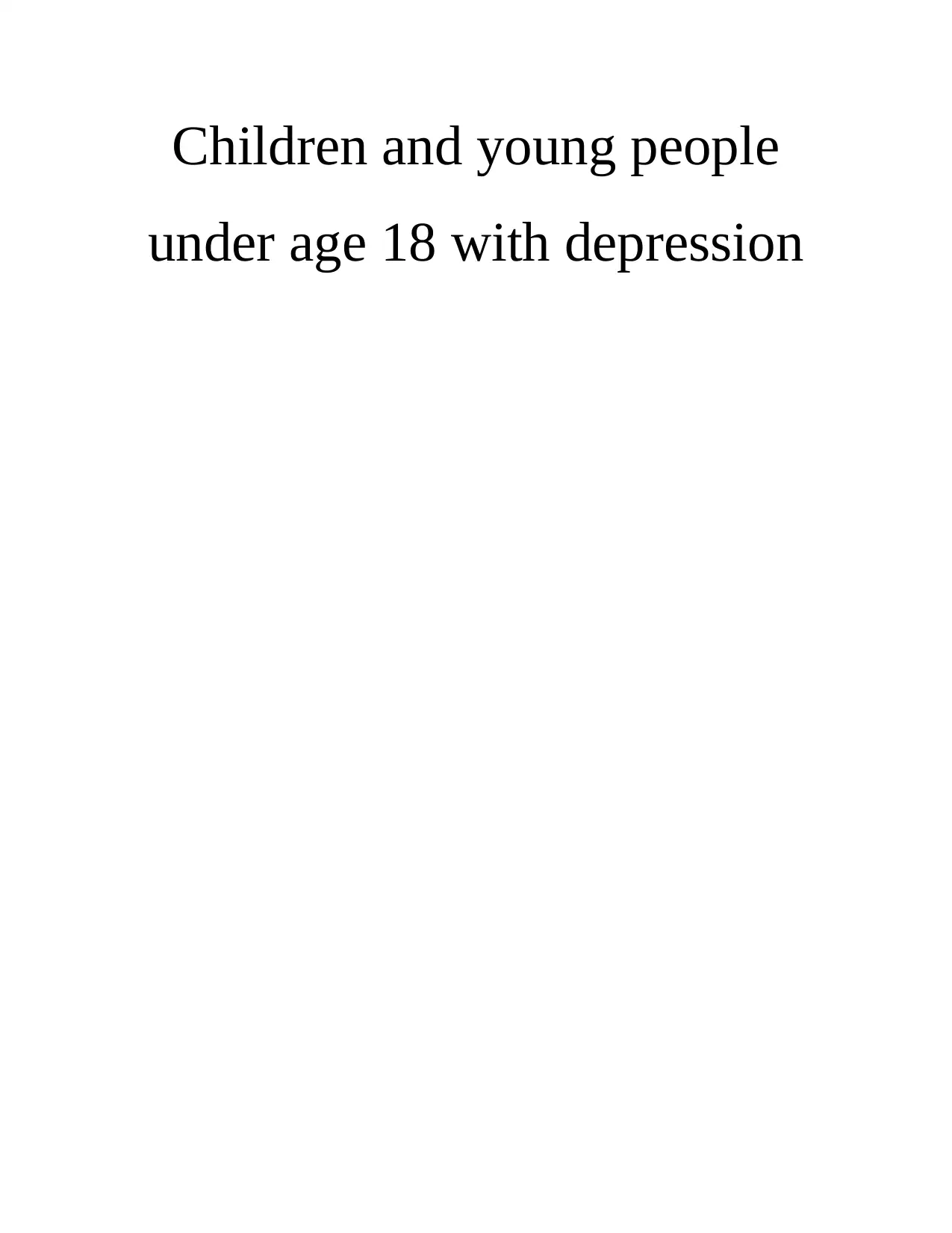
Children and young people
under age 18 with depression
under age 18 with depression
Paraphrase This Document
Need a fresh take? Get an instant paraphrase of this document with our AI Paraphraser
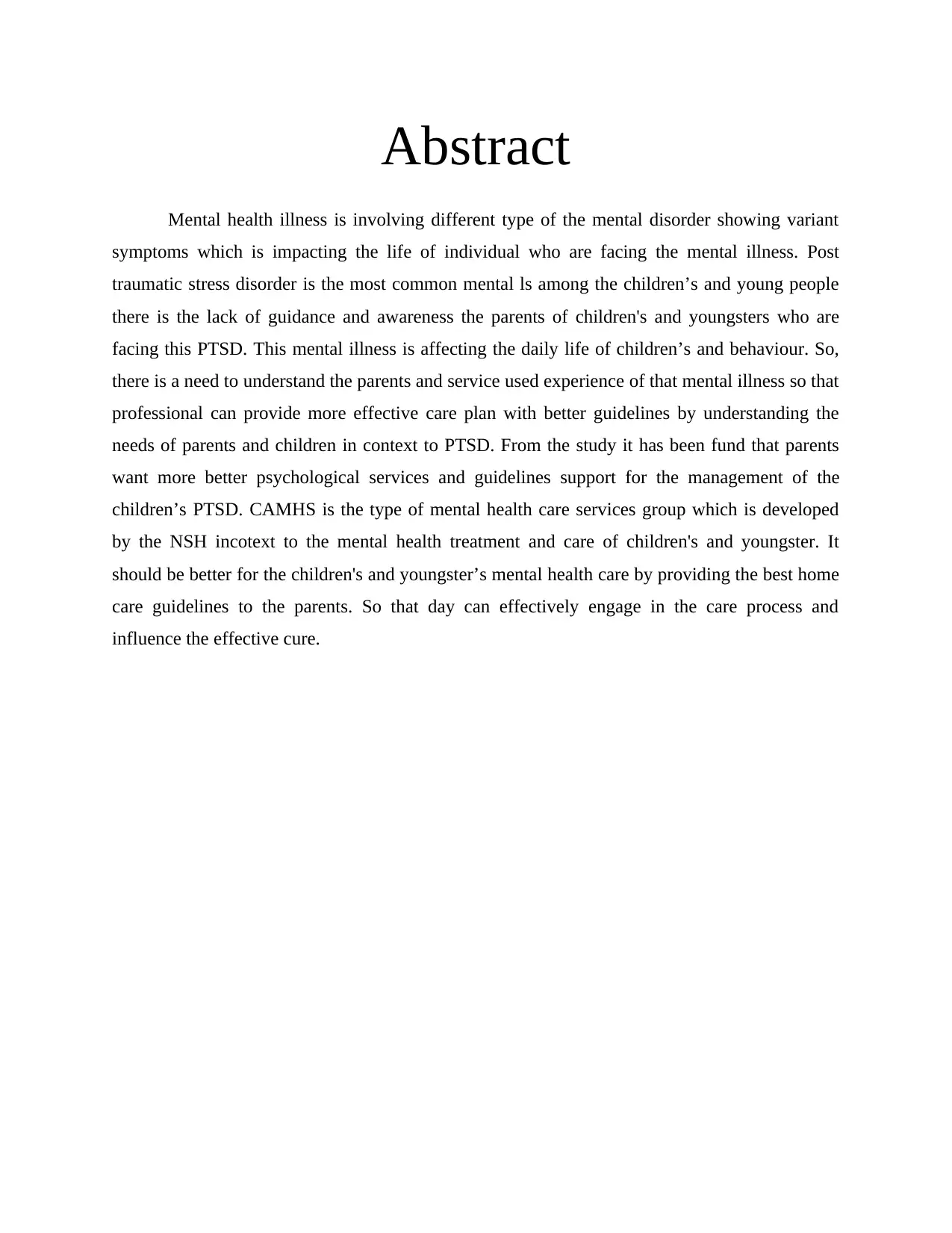
Abstract
Mental health illness is involving different type of the mental disorder showing variant
symptoms which is impacting the life of individual who are facing the mental illness. Post
traumatic stress disorder is the most common mental ls among the children’s and young people
there is the lack of guidance and awareness the parents of children's and youngsters who are
facing this PTSD. This mental illness is affecting the daily life of children’s and behaviour. So,
there is a need to understand the parents and service used experience of that mental illness so that
professional can provide more effective care plan with better guidelines by understanding the
needs of parents and children in context to PTSD. From the study it has been fund that parents
want more better psychological services and guidelines support for the management of the
children’s PTSD. CAMHS is the type of mental health care services group which is developed
by the NSH incotext to the mental health treatment and care of children's and youngster. It
should be better for the children's and youngster’s mental health care by providing the best home
care guidelines to the parents. So that day can effectively engage in the care process and
influence the effective cure.
Mental health illness is involving different type of the mental disorder showing variant
symptoms which is impacting the life of individual who are facing the mental illness. Post
traumatic stress disorder is the most common mental ls among the children’s and young people
there is the lack of guidance and awareness the parents of children's and youngsters who are
facing this PTSD. This mental illness is affecting the daily life of children’s and behaviour. So,
there is a need to understand the parents and service used experience of that mental illness so that
professional can provide more effective care plan with better guidelines by understanding the
needs of parents and children in context to PTSD. From the study it has been fund that parents
want more better psychological services and guidelines support for the management of the
children’s PTSD. CAMHS is the type of mental health care services group which is developed
by the NSH incotext to the mental health treatment and care of children's and youngster. It
should be better for the children's and youngster’s mental health care by providing the best home
care guidelines to the parents. So that day can effectively engage in the care process and
influence the effective cure.
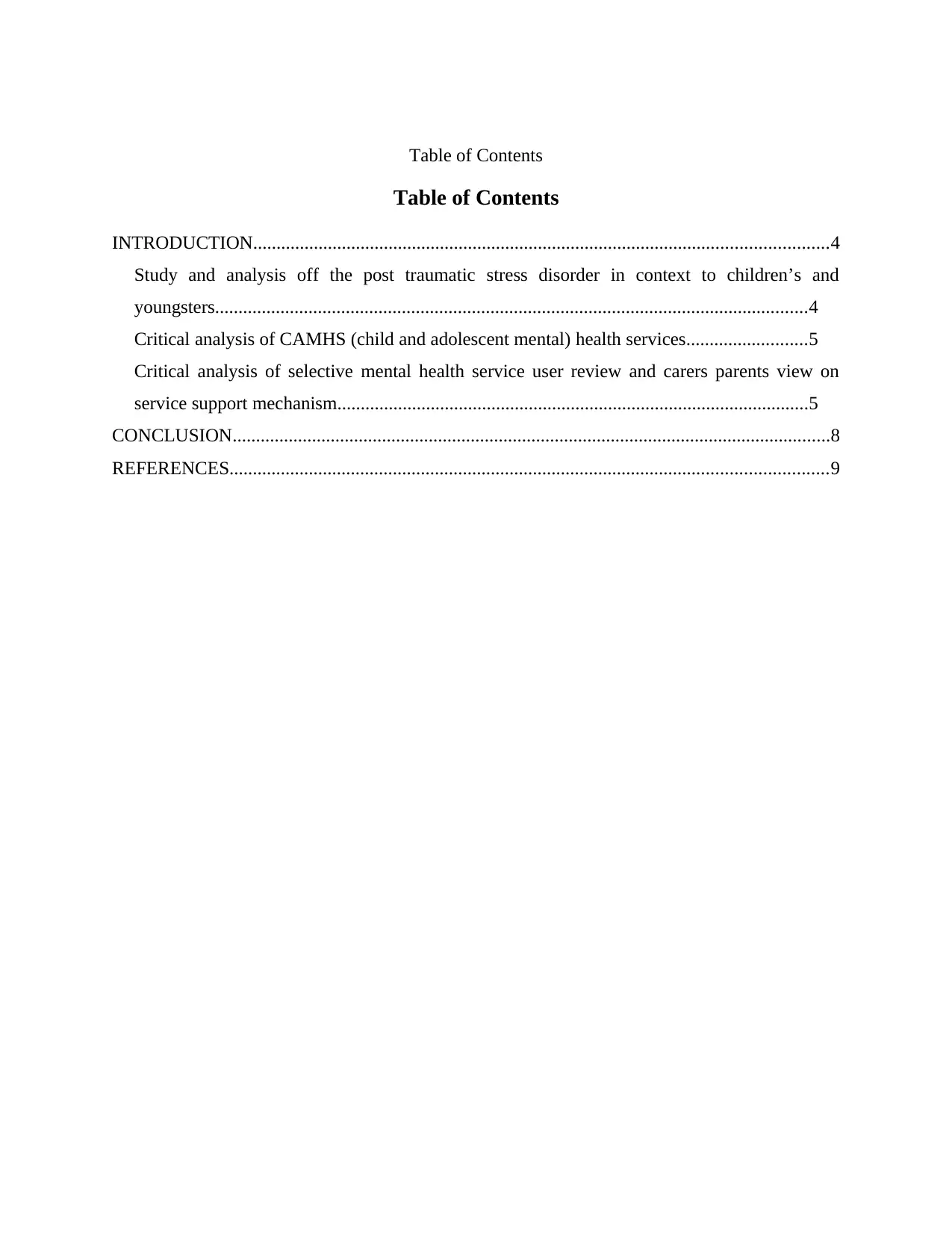
Table of Contents
Table of Contents
INTRODUCTION...........................................................................................................................4
Study and analysis off the post traumatic stress disorder in context to children’s and
youngsters...............................................................................................................................4
Critical analysis of CAMHS (child and adolescent mental) health services..........................5
Critical analysis of selective mental health service user review and carers parents view on
service support mechanism.....................................................................................................5
CONCLUSION................................................................................................................................8
REFERENCES................................................................................................................................9
Table of Contents
INTRODUCTION...........................................................................................................................4
Study and analysis off the post traumatic stress disorder in context to children’s and
youngsters...............................................................................................................................4
Critical analysis of CAMHS (child and adolescent mental) health services..........................5
Critical analysis of selective mental health service user review and carers parents view on
service support mechanism.....................................................................................................5
CONCLUSION................................................................................................................................8
REFERENCES................................................................................................................................9
⊘ This is a preview!⊘
Do you want full access?
Subscribe today to unlock all pages.

Trusted by 1+ million students worldwide
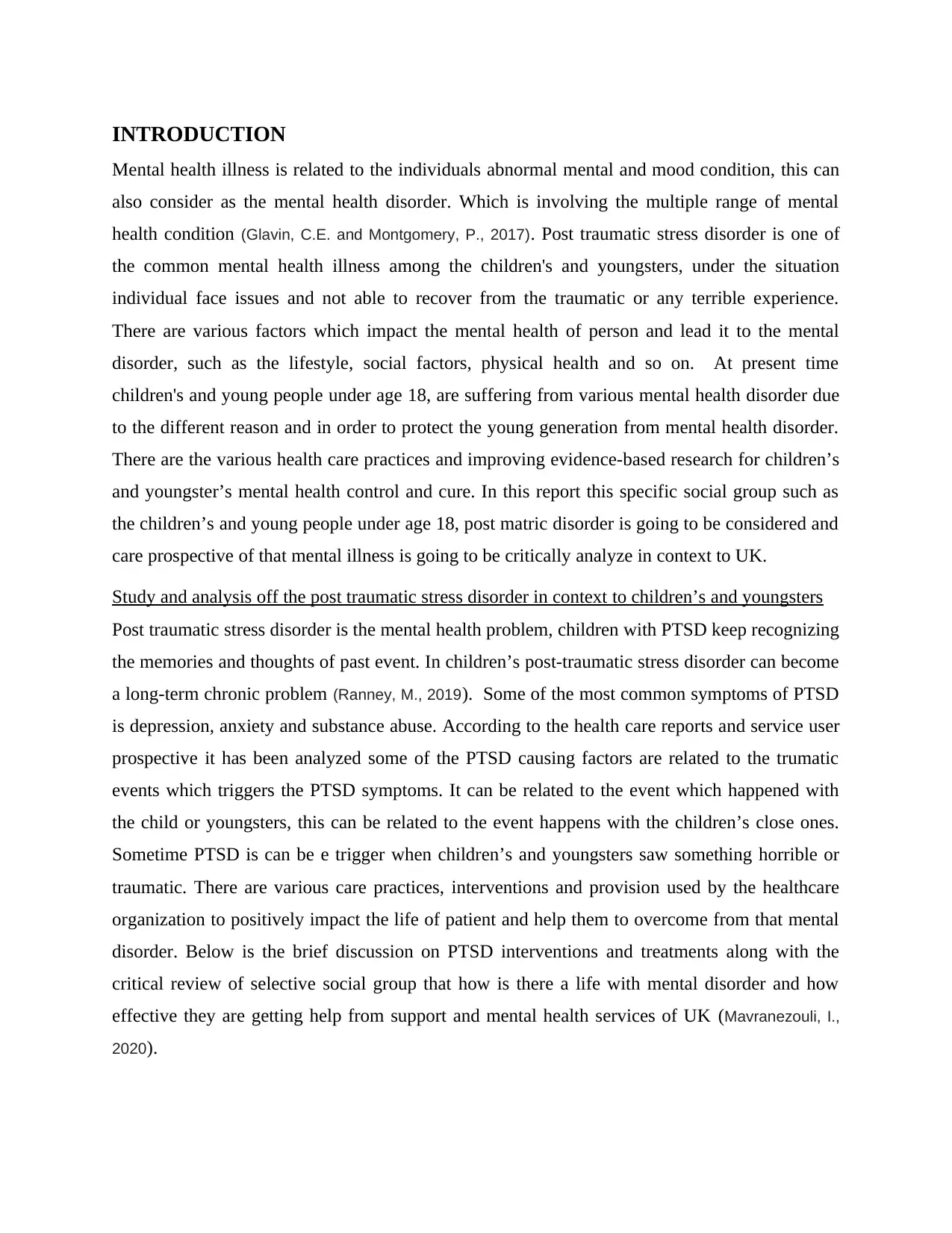
INTRODUCTION
Mental health illness is related to the individuals abnormal mental and mood condition, this can
also consider as the mental health disorder. Which is involving the multiple range of mental
health condition (Glavin, C.E. and Montgomery, P., 2017). Post traumatic stress disorder is one of
the common mental health illness among the children's and youngsters, under the situation
individual face issues and not able to recover from the traumatic or any terrible experience.
There are various factors which impact the mental health of person and lead it to the mental
disorder, such as the lifestyle, social factors, physical health and so on. At present time
children's and young people under age 18, are suffering from various mental health disorder due
to the different reason and in order to protect the young generation from mental health disorder.
There are the various health care practices and improving evidence-based research for children’s
and youngster’s mental health control and cure. In this report this specific social group such as
the children’s and young people under age 18, post matric disorder is going to be considered and
care prospective of that mental illness is going to be critically analyze in context to UK.
Study and analysis off the post traumatic stress disorder in context to children’s and youngsters
Post traumatic stress disorder is the mental health problem, children with PTSD keep recognizing
the memories and thoughts of past event. In children’s post-traumatic stress disorder can become
a long-term chronic problem (Ranney, M., 2019). Some of the most common symptoms of PTSD
is depression, anxiety and substance abuse. According to the health care reports and service user
prospective it has been analyzed some of the PTSD causing factors are related to the trumatic
events which triggers the PTSD symptoms. It can be related to the event which happened with
the child or youngsters, this can be related to the event happens with the children’s close ones.
Sometime PTSD is can be e trigger when children’s and youngsters saw something horrible or
traumatic. There are various care practices, interventions and provision used by the healthcare
organization to positively impact the life of patient and help them to overcome from that mental
disorder. Below is the brief discussion on PTSD interventions and treatments along with the
critical review of selective social group that how is there a life with mental disorder and how
effective they are getting help from support and mental health services of UK (Mavranezouli, I.,
2020).
Mental health illness is related to the individuals abnormal mental and mood condition, this can
also consider as the mental health disorder. Which is involving the multiple range of mental
health condition (Glavin, C.E. and Montgomery, P., 2017). Post traumatic stress disorder is one of
the common mental health illness among the children's and youngsters, under the situation
individual face issues and not able to recover from the traumatic or any terrible experience.
There are various factors which impact the mental health of person and lead it to the mental
disorder, such as the lifestyle, social factors, physical health and so on. At present time
children's and young people under age 18, are suffering from various mental health disorder due
to the different reason and in order to protect the young generation from mental health disorder.
There are the various health care practices and improving evidence-based research for children’s
and youngster’s mental health control and cure. In this report this specific social group such as
the children’s and young people under age 18, post matric disorder is going to be considered and
care prospective of that mental illness is going to be critically analyze in context to UK.
Study and analysis off the post traumatic stress disorder in context to children’s and youngsters
Post traumatic stress disorder is the mental health problem, children with PTSD keep recognizing
the memories and thoughts of past event. In children’s post-traumatic stress disorder can become
a long-term chronic problem (Ranney, M., 2019). Some of the most common symptoms of PTSD
is depression, anxiety and substance abuse. According to the health care reports and service user
prospective it has been analyzed some of the PTSD causing factors are related to the trumatic
events which triggers the PTSD symptoms. It can be related to the event which happened with
the child or youngsters, this can be related to the event happens with the children’s close ones.
Sometime PTSD is can be e trigger when children’s and youngsters saw something horrible or
traumatic. There are various care practices, interventions and provision used by the healthcare
organization to positively impact the life of patient and help them to overcome from that mental
disorder. Below is the brief discussion on PTSD interventions and treatments along with the
critical review of selective social group that how is there a life with mental disorder and how
effective they are getting help from support and mental health services of UK (Mavranezouli, I.,
2020).
Paraphrase This Document
Need a fresh take? Get an instant paraphrase of this document with our AI Paraphraser
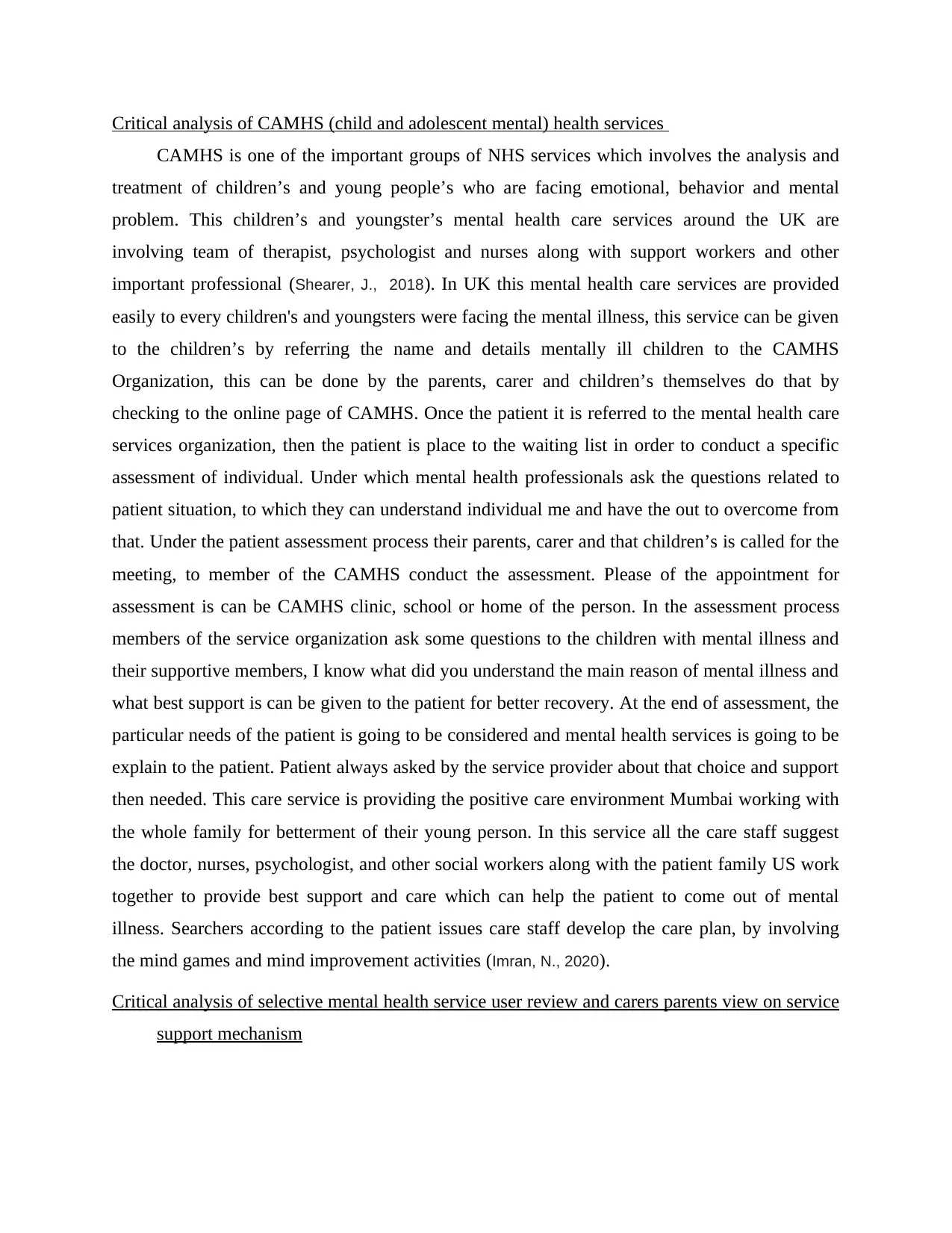
Critical analysis of CAMHS (child and adolescent mental) health services
CAMHS is one of the important groups of NHS services which involves the analysis and
treatment of children’s and young people’s who are facing emotional, behavior and mental
problem. This children’s and youngster’s mental health care services around the UK are
involving team of therapist, psychologist and nurses along with support workers and other
important professional (Shearer, J., 2018). In UK this mental health care services are provided
easily to every children's and youngsters were facing the mental illness, this service can be given
to the children’s by referring the name and details mentally ill children to the CAMHS
Organization, this can be done by the parents, carer and children’s themselves do that by
checking to the online page of CAMHS. Once the patient it is referred to the mental health care
services organization, then the patient is place to the waiting list in order to conduct a specific
assessment of individual. Under which mental health professionals ask the questions related to
patient situation, to which they can understand individual me and have the out to overcome from
that. Under the patient assessment process their parents, carer and that children’s is called for the
meeting, to member of the CAMHS conduct the assessment. Please of the appointment for
assessment is can be CAMHS clinic, school or home of the person. In the assessment process
members of the service organization ask some questions to the children with mental illness and
their supportive members, I know what did you understand the main reason of mental illness and
what best support is can be given to the patient for better recovery. At the end of assessment, the
particular needs of the patient is going to be considered and mental health services is going to be
explain to the patient. Patient always asked by the service provider about that choice and support
then needed. This care service is providing the positive care environment Mumbai working with
the whole family for betterment of their young person. In this service all the care staff suggest
the doctor, nurses, psychologist, and other social workers along with the patient family US work
together to provide best support and care which can help the patient to come out of mental
illness. Searchers according to the patient issues care staff develop the care plan, by involving
the mind games and mind improvement activities (Imran, N., 2020).
Critical analysis of selective mental health service user review and carers parents view on service
support mechanism
CAMHS is one of the important groups of NHS services which involves the analysis and
treatment of children’s and young people’s who are facing emotional, behavior and mental
problem. This children’s and youngster’s mental health care services around the UK are
involving team of therapist, psychologist and nurses along with support workers and other
important professional (Shearer, J., 2018). In UK this mental health care services are provided
easily to every children's and youngsters were facing the mental illness, this service can be given
to the children’s by referring the name and details mentally ill children to the CAMHS
Organization, this can be done by the parents, carer and children’s themselves do that by
checking to the online page of CAMHS. Once the patient it is referred to the mental health care
services organization, then the patient is place to the waiting list in order to conduct a specific
assessment of individual. Under which mental health professionals ask the questions related to
patient situation, to which they can understand individual me and have the out to overcome from
that. Under the patient assessment process their parents, carer and that children’s is called for the
meeting, to member of the CAMHS conduct the assessment. Please of the appointment for
assessment is can be CAMHS clinic, school or home of the person. In the assessment process
members of the service organization ask some questions to the children with mental illness and
their supportive members, I know what did you understand the main reason of mental illness and
what best support is can be given to the patient for better recovery. At the end of assessment, the
particular needs of the patient is going to be considered and mental health services is going to be
explain to the patient. Patient always asked by the service provider about that choice and support
then needed. This care service is providing the positive care environment Mumbai working with
the whole family for betterment of their young person. In this service all the care staff suggest
the doctor, nurses, psychologist, and other social workers along with the patient family US work
together to provide best support and care which can help the patient to come out of mental
illness. Searchers according to the patient issues care staff develop the care plan, by involving
the mind games and mind improvement activities (Imran, N., 2020).
Critical analysis of selective mental health service user review and carers parents view on service
support mechanism
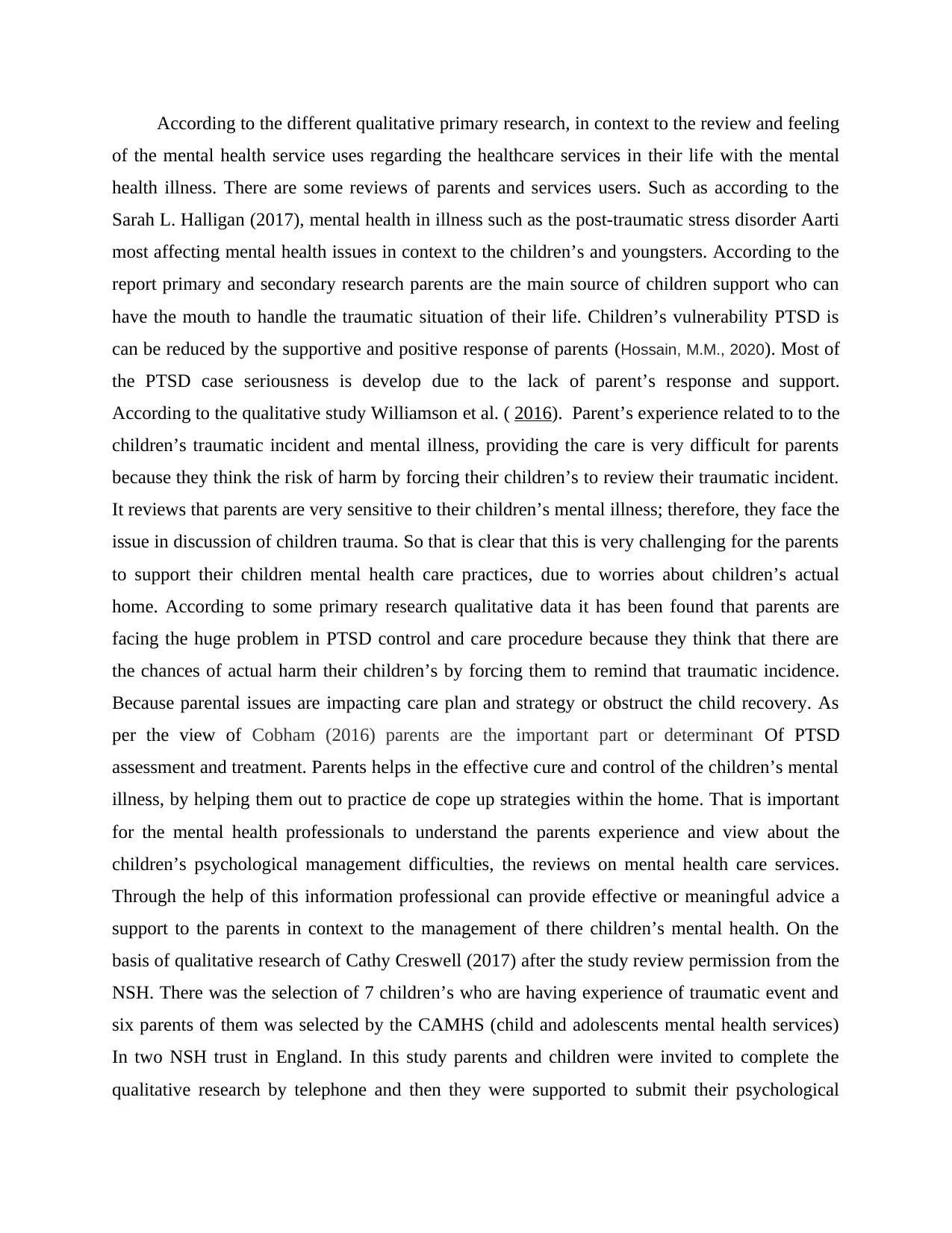
According to the different qualitative primary research, in context to the review and feeling
of the mental health service uses regarding the healthcare services in their life with the mental
health illness. There are some reviews of parents and services users. Such as according to the
Sarah L. Halligan (2017), mental health in illness such as the post-traumatic stress disorder Aarti
most affecting mental health issues in context to the children’s and youngsters. According to the
report primary and secondary research parents are the main source of children support who can
have the mouth to handle the traumatic situation of their life. Children’s vulnerability PTSD is
can be reduced by the supportive and positive response of parents (Hossain, M.M., 2020). Most of
the PTSD case seriousness is develop due to the lack of parent’s response and support.
According to the qualitative study Williamson et al. ( 2016). Parent’s experience related to to the
children’s traumatic incident and mental illness, providing the care is very difficult for parents
because they think the risk of harm by forcing their children’s to review their traumatic incident.
It reviews that parents are very sensitive to their children’s mental illness; therefore, they face the
issue in discussion of children trauma. So that is clear that this is very challenging for the parents
to support their children mental health care practices, due to worries about children’s actual
home. According to some primary research qualitative data it has been found that parents are
facing the huge problem in PTSD control and care procedure because they think that there are
the chances of actual harm their children’s by forcing them to remind that traumatic incidence.
Because parental issues are impacting care plan and strategy or obstruct the child recovery. As
per the view of Cobham (2016) parents are the important part or determinant Of PTSD
assessment and treatment. Parents helps in the effective cure and control of the children’s mental
illness, by helping them out to practice de cope up strategies within the home. That is important
for the mental health professionals to understand the parents experience and view about the
children’s psychological management difficulties, the reviews on mental health care services.
Through the help of this information professional can provide effective or meaningful advice a
support to the parents in context to the management of there children’s mental health. On the
basis of qualitative research of Cathy Creswell (2017) after the study review permission from the
NSH. There was the selection of 7 children’s who are having experience of traumatic event and
six parents of them was selected by the CAMHS (child and adolescents mental health services)
In two NSH trust in England. In this study parents and children were invited to complete the
qualitative research by telephone and then they were supported to submit their psychological
of the mental health service uses regarding the healthcare services in their life with the mental
health illness. There are some reviews of parents and services users. Such as according to the
Sarah L. Halligan (2017), mental health in illness such as the post-traumatic stress disorder Aarti
most affecting mental health issues in context to the children’s and youngsters. According to the
report primary and secondary research parents are the main source of children support who can
have the mouth to handle the traumatic situation of their life. Children’s vulnerability PTSD is
can be reduced by the supportive and positive response of parents (Hossain, M.M., 2020). Most of
the PTSD case seriousness is develop due to the lack of parent’s response and support.
According to the qualitative study Williamson et al. ( 2016). Parent’s experience related to to the
children’s traumatic incident and mental illness, providing the care is very difficult for parents
because they think the risk of harm by forcing their children’s to review their traumatic incident.
It reviews that parents are very sensitive to their children’s mental illness; therefore, they face the
issue in discussion of children trauma. So that is clear that this is very challenging for the parents
to support their children mental health care practices, due to worries about children’s actual
home. According to some primary research qualitative data it has been found that parents are
facing the huge problem in PTSD control and care procedure because they think that there are
the chances of actual harm their children’s by forcing them to remind that traumatic incidence.
Because parental issues are impacting care plan and strategy or obstruct the child recovery. As
per the view of Cobham (2016) parents are the important part or determinant Of PTSD
assessment and treatment. Parents helps in the effective cure and control of the children’s mental
illness, by helping them out to practice de cope up strategies within the home. That is important
for the mental health professionals to understand the parents experience and view about the
children’s psychological management difficulties, the reviews on mental health care services.
Through the help of this information professional can provide effective or meaningful advice a
support to the parents in context to the management of there children’s mental health. On the
basis of qualitative research of Cathy Creswell (2017) after the study review permission from the
NSH. There was the selection of 7 children’s who are having experience of traumatic event and
six parents of them was selected by the CAMHS (child and adolescents mental health services)
In two NSH trust in England. In this study parents and children were invited to complete the
qualitative research by telephone and then they were supported to submit their psychological
⊘ This is a preview!⊘
Do you want full access?
Subscribe today to unlock all pages.

Trusted by 1+ million students worldwide
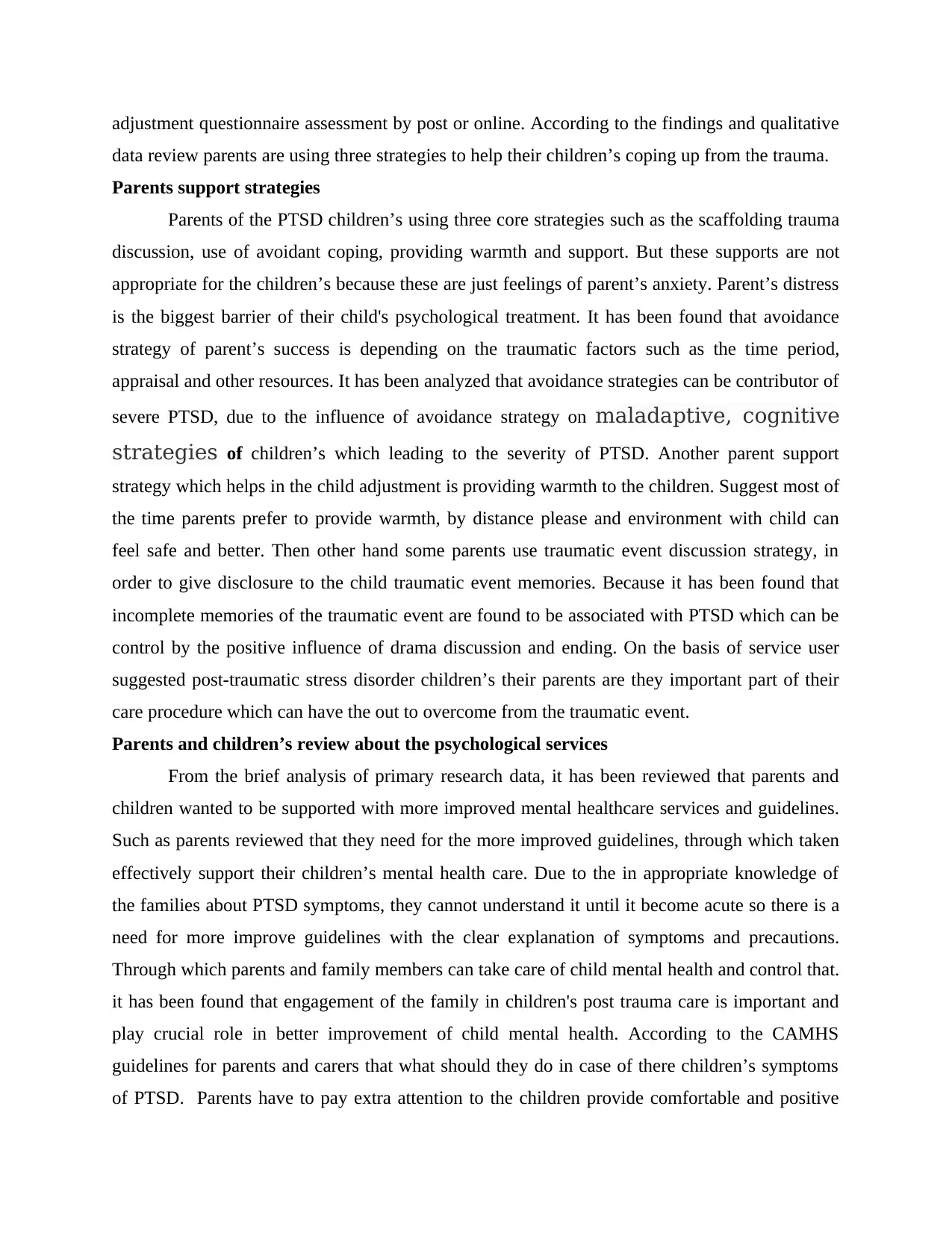
adjustment questionnaire assessment by post or online. According to the findings and qualitative
data review parents are using three strategies to help their children’s coping up from the trauma.
Parents support strategies
Parents of the PTSD children’s using three core strategies such as the scaffolding trauma
discussion, use of avoidant coping, providing warmth and support. But these supports are not
appropriate for the children’s because these are just feelings of parent’s anxiety. Parent’s distress
is the biggest barrier of their child's psychological treatment. It has been found that avoidance
strategy of parent’s success is depending on the traumatic factors such as the time period,
appraisal and other resources. It has been analyzed that avoidance strategies can be contributor of
severe PTSD, due to the influence of avoidance strategy on maladaptive, cognitive
strategies of children’s which leading to the severity of PTSD. Another parent support
strategy which helps in the child adjustment is providing warmth to the children. Suggest most of
the time parents prefer to provide warmth, by distance please and environment with child can
feel safe and better. Then other hand some parents use traumatic event discussion strategy, in
order to give disclosure to the child traumatic event memories. Because it has been found that
incomplete memories of the traumatic event are found to be associated with PTSD which can be
control by the positive influence of drama discussion and ending. On the basis of service user
suggested post-traumatic stress disorder children’s their parents are they important part of their
care procedure which can have the out to overcome from the traumatic event.
Parents and children’s review about the psychological services
From the brief analysis of primary research data, it has been reviewed that parents and
children wanted to be supported with more improved mental healthcare services and guidelines.
Such as parents reviewed that they need for the more improved guidelines, through which taken
effectively support their children’s mental health care. Due to the in appropriate knowledge of
the families about PTSD symptoms, they cannot understand it until it become acute so there is a
need for more improve guidelines with the clear explanation of symptoms and precautions.
Through which parents and family members can take care of child mental health and control that.
it has been found that engagement of the family in children's post trauma care is important and
play crucial role in better improvement of child mental health. According to the CAMHS
guidelines for parents and carers that what should they do in case of there children’s symptoms
of PTSD. Parents have to pay extra attention to the children provide comfortable and positive
data review parents are using three strategies to help their children’s coping up from the trauma.
Parents support strategies
Parents of the PTSD children’s using three core strategies such as the scaffolding trauma
discussion, use of avoidant coping, providing warmth and support. But these supports are not
appropriate for the children’s because these are just feelings of parent’s anxiety. Parent’s distress
is the biggest barrier of their child's psychological treatment. It has been found that avoidance
strategy of parent’s success is depending on the traumatic factors such as the time period,
appraisal and other resources. It has been analyzed that avoidance strategies can be contributor of
severe PTSD, due to the influence of avoidance strategy on maladaptive, cognitive
strategies of children’s which leading to the severity of PTSD. Another parent support
strategy which helps in the child adjustment is providing warmth to the children. Suggest most of
the time parents prefer to provide warmth, by distance please and environment with child can
feel safe and better. Then other hand some parents use traumatic event discussion strategy, in
order to give disclosure to the child traumatic event memories. Because it has been found that
incomplete memories of the traumatic event are found to be associated with PTSD which can be
control by the positive influence of drama discussion and ending. On the basis of service user
suggested post-traumatic stress disorder children’s their parents are they important part of their
care procedure which can have the out to overcome from the traumatic event.
Parents and children’s review about the psychological services
From the brief analysis of primary research data, it has been reviewed that parents and
children wanted to be supported with more improved mental healthcare services and guidelines.
Such as parents reviewed that they need for the more improved guidelines, through which taken
effectively support their children’s mental health care. Due to the in appropriate knowledge of
the families about PTSD symptoms, they cannot understand it until it become acute so there is a
need for more improve guidelines with the clear explanation of symptoms and precautions.
Through which parents and family members can take care of child mental health and control that.
it has been found that engagement of the family in children's post trauma care is important and
play crucial role in better improvement of child mental health. According to the CAMHS
guidelines for parents and carers that what should they do in case of there children’s symptoms
of PTSD. Parents have to pay extra attention to the children provide comfortable and positive
Paraphrase This Document
Need a fresh take? Get an instant paraphrase of this document with our AI Paraphraser
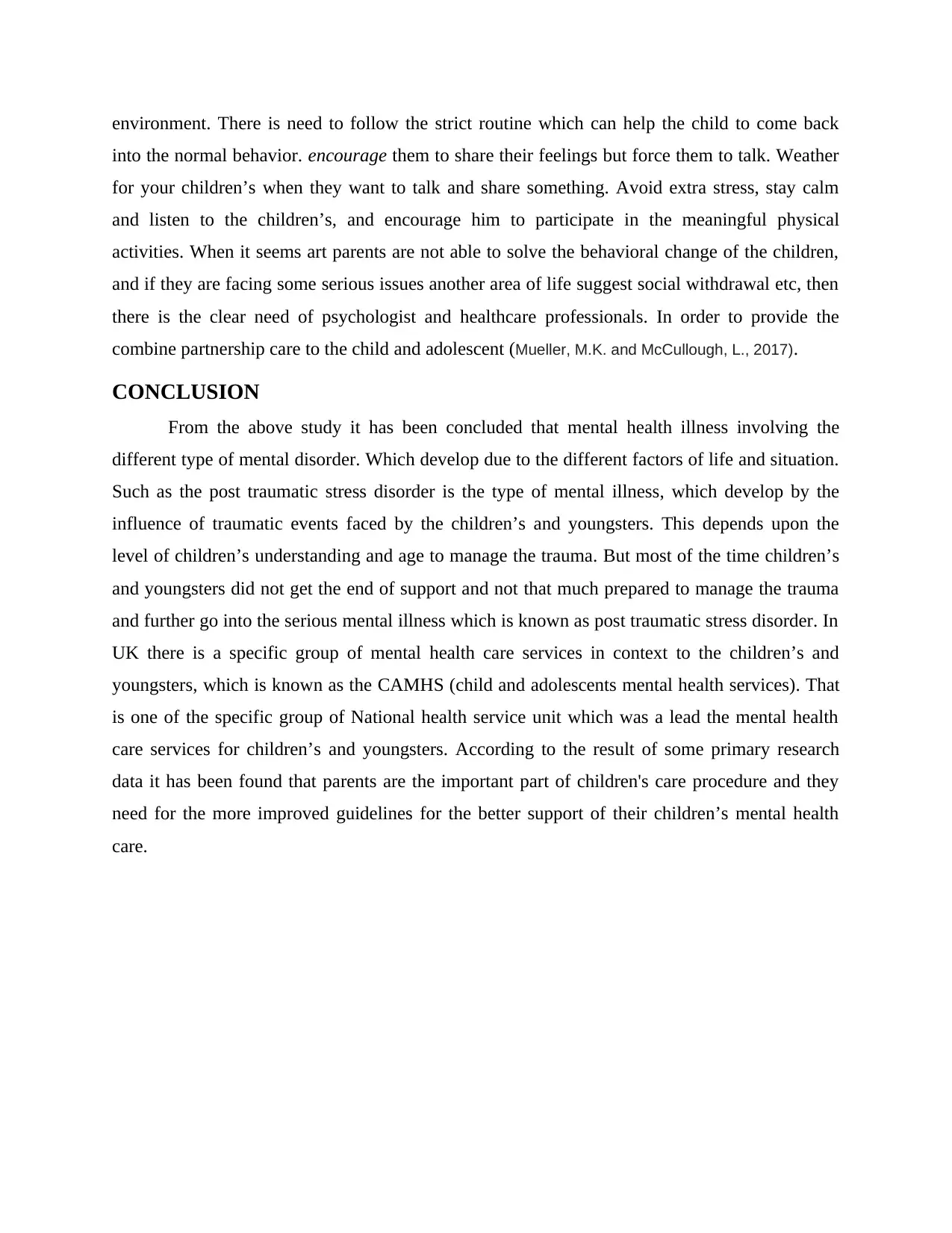
environment. There is need to follow the strict routine which can help the child to come back
into the normal behavior. encourage them to share their feelings but force them to talk. Weather
for your children’s when they want to talk and share something. Avoid extra stress, stay calm
and listen to the children’s, and encourage him to participate in the meaningful physical
activities. When it seems art parents are not able to solve the behavioral change of the children,
and if they are facing some serious issues another area of life suggest social withdrawal etc, then
there is the clear need of psychologist and healthcare professionals. In order to provide the
combine partnership care to the child and adolescent (Mueller, M.K. and McCullough, L., 2017).
CONCLUSION
From the above study it has been concluded that mental health illness involving the
different type of mental disorder. Which develop due to the different factors of life and situation.
Such as the post traumatic stress disorder is the type of mental illness, which develop by the
influence of traumatic events faced by the children’s and youngsters. This depends upon the
level of children’s understanding and age to manage the trauma. But most of the time children’s
and youngsters did not get the end of support and not that much prepared to manage the trauma
and further go into the serious mental illness which is known as post traumatic stress disorder. In
UK there is a specific group of mental health care services in context to the children’s and
youngsters, which is known as the CAMHS (child and adolescents mental health services). That
is one of the specific group of National health service unit which was a lead the mental health
care services for children’s and youngsters. According to the result of some primary research
data it has been found that parents are the important part of children's care procedure and they
need for the more improved guidelines for the better support of their children’s mental health
care.
into the normal behavior. encourage them to share their feelings but force them to talk. Weather
for your children’s when they want to talk and share something. Avoid extra stress, stay calm
and listen to the children’s, and encourage him to participate in the meaningful physical
activities. When it seems art parents are not able to solve the behavioral change of the children,
and if they are facing some serious issues another area of life suggest social withdrawal etc, then
there is the clear need of psychologist and healthcare professionals. In order to provide the
combine partnership care to the child and adolescent (Mueller, M.K. and McCullough, L., 2017).
CONCLUSION
From the above study it has been concluded that mental health illness involving the
different type of mental disorder. Which develop due to the different factors of life and situation.
Such as the post traumatic stress disorder is the type of mental illness, which develop by the
influence of traumatic events faced by the children’s and youngsters. This depends upon the
level of children’s understanding and age to manage the trauma. But most of the time children’s
and youngsters did not get the end of support and not that much prepared to manage the trauma
and further go into the serious mental illness which is known as post traumatic stress disorder. In
UK there is a specific group of mental health care services in context to the children’s and
youngsters, which is known as the CAMHS (child and adolescents mental health services). That
is one of the specific group of National health service unit which was a lead the mental health
care services for children’s and youngsters. According to the result of some primary research
data it has been found that parents are the important part of children's care procedure and they
need for the more improved guidelines for the better support of their children’s mental health
care.
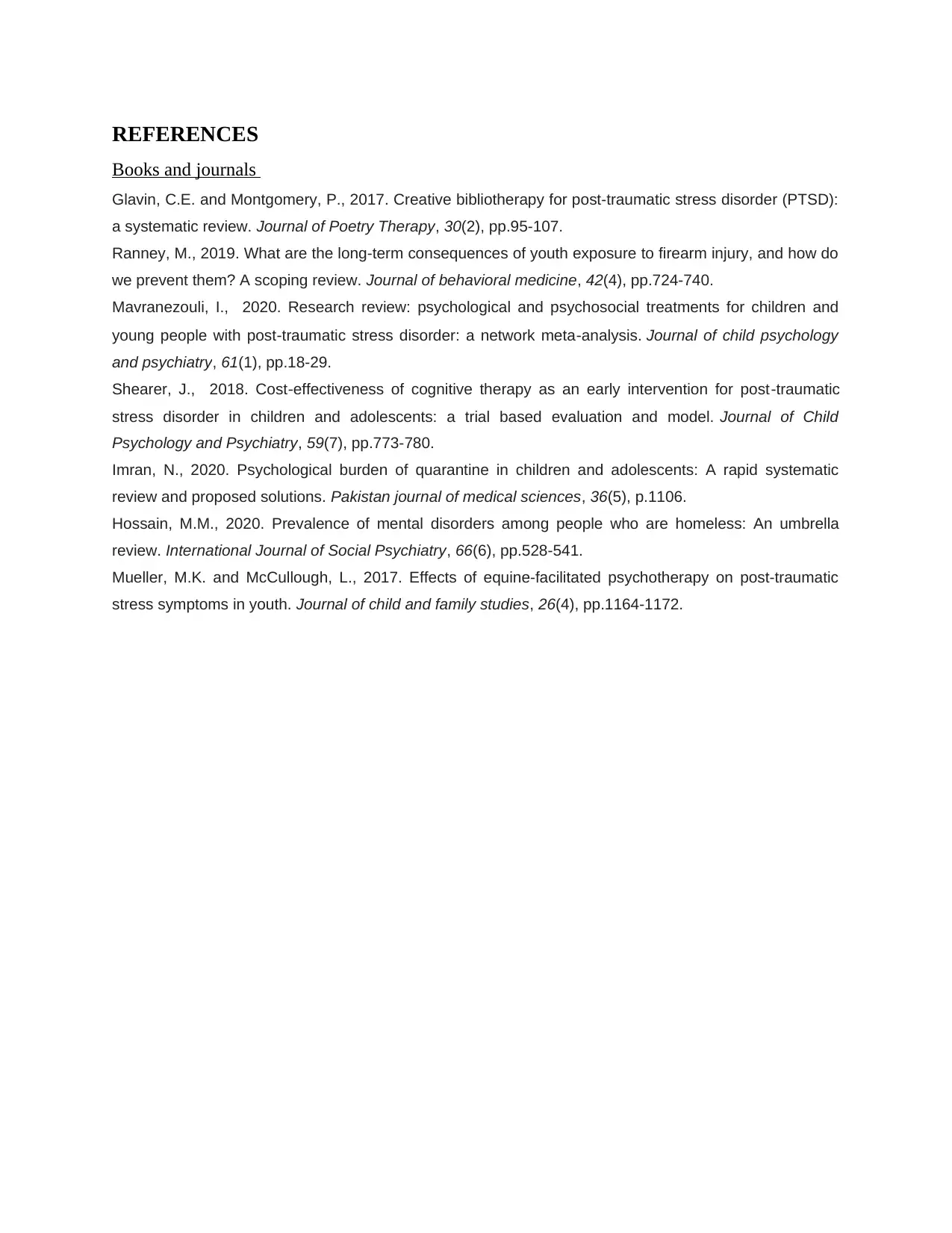
REFERENCES
Books and journals
Glavin, C.E. and Montgomery, P., 2017. Creative bibliotherapy for post-traumatic stress disorder (PTSD):
a systematic review. Journal of Poetry Therapy, 30(2), pp.95-107.
Ranney, M., 2019. What are the long-term consequences of youth exposure to firearm injury, and how do
we prevent them? A scoping review. Journal of behavioral medicine, 42(4), pp.724-740.
Mavranezouli, I., 2020. Research review: psychological and psychosocial treatments for children and
young people with post‐traumatic stress disorder: a network meta‐analysis. Journal of child psychology
and psychiatry, 61(1), pp.18-29.
Shearer, J., 2018. Cost‐effectiveness of cognitive therapy as an early intervention for post‐traumatic
stress disorder in children and adolescents: a trial based evaluation and model. Journal of Child
Psychology and Psychiatry, 59(7), pp.773-780.
Imran, N., 2020. Psychological burden of quarantine in children and adolescents: A rapid systematic
review and proposed solutions. Pakistan journal of medical sciences, 36(5), p.1106.
Hossain, M.M., 2020. Prevalence of mental disorders among people who are homeless: An umbrella
review. International Journal of Social Psychiatry, 66(6), pp.528-541.
Mueller, M.K. and McCullough, L., 2017. Effects of equine-facilitated psychotherapy on post-traumatic
stress symptoms in youth. Journal of child and family studies, 26(4), pp.1164-1172.
Books and journals
Glavin, C.E. and Montgomery, P., 2017. Creative bibliotherapy for post-traumatic stress disorder (PTSD):
a systematic review. Journal of Poetry Therapy, 30(2), pp.95-107.
Ranney, M., 2019. What are the long-term consequences of youth exposure to firearm injury, and how do
we prevent them? A scoping review. Journal of behavioral medicine, 42(4), pp.724-740.
Mavranezouli, I., 2020. Research review: psychological and psychosocial treatments for children and
young people with post‐traumatic stress disorder: a network meta‐analysis. Journal of child psychology
and psychiatry, 61(1), pp.18-29.
Shearer, J., 2018. Cost‐effectiveness of cognitive therapy as an early intervention for post‐traumatic
stress disorder in children and adolescents: a trial based evaluation and model. Journal of Child
Psychology and Psychiatry, 59(7), pp.773-780.
Imran, N., 2020. Psychological burden of quarantine in children and adolescents: A rapid systematic
review and proposed solutions. Pakistan journal of medical sciences, 36(5), p.1106.
Hossain, M.M., 2020. Prevalence of mental disorders among people who are homeless: An umbrella
review. International Journal of Social Psychiatry, 66(6), pp.528-541.
Mueller, M.K. and McCullough, L., 2017. Effects of equine-facilitated psychotherapy on post-traumatic
stress symptoms in youth. Journal of child and family studies, 26(4), pp.1164-1172.
⊘ This is a preview!⊘
Do you want full access?
Subscribe today to unlock all pages.

Trusted by 1+ million students worldwide
1 out of 9
Related Documents
Your All-in-One AI-Powered Toolkit for Academic Success.
+13062052269
info@desklib.com
Available 24*7 on WhatsApp / Email
![[object Object]](/_next/static/media/star-bottom.7253800d.svg)
Unlock your academic potential
Copyright © 2020–2026 A2Z Services. All Rights Reserved. Developed and managed by ZUCOL.





